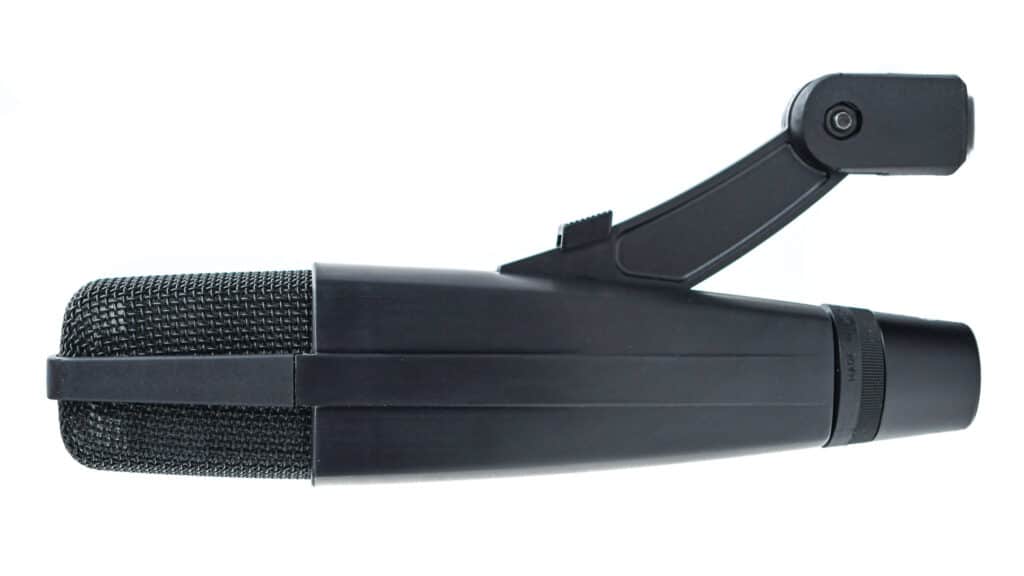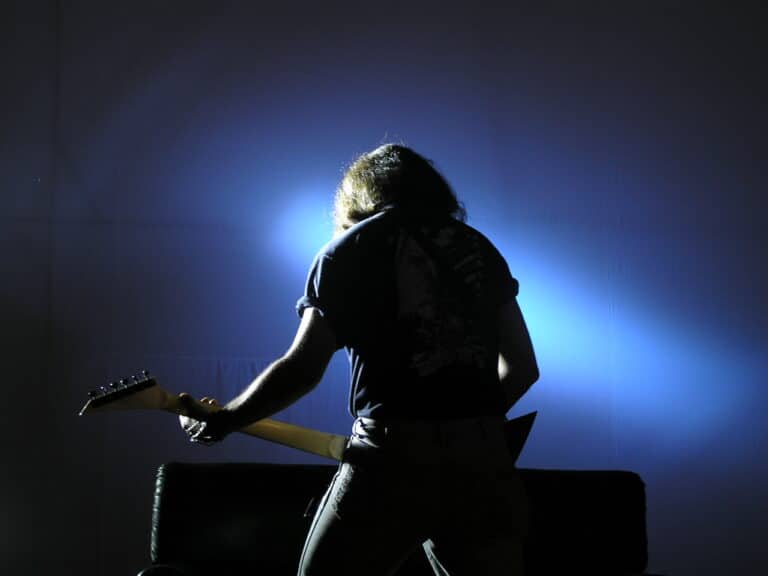Last Updated on January 4, 2024 by IDS Team
Picking the best microphone for metal guitar is a tough choice. Condenser, dynamic, or ribbon? Yes, there are industry favourites, and many guitar mics suit multiple genres. In fact, I’ve looked at the topic before with the best mic for recording electric guitar in general.
However, from high-octane shredded solos to dark, crunchy riffs, the best microphone for metal guitar needs some specialist consideration. Read on as we dig deep into what’s on offer in terms of the ideal cab mic for your studio.
Best budget microphone metal guitar – Audix i5
The Audix i5 is a specialist cab mic that can handle sounds up to 140dB. As a result, it’s perfect for metal guitar and makes for a great budget mic for recording guitar amps in general. It’s a great alternative to popular Shure mics, such as the SM58 which we cover in this article here. Yes, Shure has made a name for itself for really affordable and durable mics like the Sm57 and Sm58. They can easily take the kinds of sounds of metal guitar, but they’re not the only option.

The Audix i5 is brilliant if you don’t want quite the same kind of sound as everyone else. Yet the i5 is also great if you want to emphasize the upper frequencies. This can bring some much-needed brightness to heavy or even detuned guitars. Therefore you can create a wall of sound when you need, but also have the option to tone things down for breaks or quiet moments.
General specs: dynamic cardioid mic with a 50 Hz to 16 kHz frequency response and over 140 dB SPLPrice: Around 100 USD on Reverb.com. Please click here to see current offers and if you buy using our links we will get a small kickback, so you will be supporting idesignsound.com
Good contender: the Sennheiser e906
We’re mentioning this one for 2023 because of the fact that these choices don’t have to be either/or. We’ve seen some musicians even use the e906 alongside the Audix competitor, the SM57, for an ultra heavy sound.
However, we mention the e906 here for its super-cardioid pattern, robustness, and sensitivity. This is a mic that is, firstly, quite hard to damage. Second, it’s versatile. It’s also great for drums, so it can cover a decent part of your recording setup if you’re on a budget. Its fast attack makes it brilliant for detailed metal solos.
And it’s three-position sound character switch means that you can create and sculpt atmosphere by going bright, moderate, or dark.
It IS slightly more expensive than the Audix i5, at approx 160 USD depending on the retailer. That’s why the Audix i5 slightly wins out for us. However, we mention it here if you want some more variety that is not just entry-level.
Best Shure alternative and complement – Sennheiser MD421
Like some of the other mics on this list, the Sennheiser MD421 is often known as a broadcasting mic. Although you could opt for a condenser broadcasting mic like the Earthworks Icon Pro, dynamic mics like the MD421 are preferred by many musicians as they prevent your track sounding muddy. Like the i5, it’s a great alternative if you don’t want one of the ubiquitous Shure mics. However, it can also work to complement them. if you’re not super familiar with how to mic electric guitar, note that you’ll rarely just be using one mic on a guitar cab. Therefore with two different microphones, you get more options for controlling tone.

This is a cardioid mic, meaning that the sound pickup pattern extends far in front of the mic but minimizes pickup from the back. Therefore, when you point it at your desired source of sound (normally your guitar amp) it minimizes reverberations or room noise from behind the mic.
General specs: dynamic cardioid mic, 30 – 17,000 Hz frequency response, max SPL of 150 dB
Price: Arround 300-350 USD on Reverb.com. Please click here to see current offers.
Best supercardioid microphone metal guitar – Sennheiser e609
One thing you may find is metal guitar mic placement needs a lot of precision. Like its sister mic the Sennheiser e906, the e609 is super-cardioid. Like a cardioid mic it’s very sensitive to the sound that you point it at (called the axis). However, instead of finding the least sensitive point at the back, it has two on either side of the 360 degrees surrounding the mic.
Like how some other cab mics are popular in broadcasting, super-cardioid mics are a favorite in the film industry. The reason they work for metal is that on the one hand they offer the slickness and sensitivity of a cardioid to prevent muddiness. On the other, they pick up sounds at the back means there is just enough atmosphere. This is also less delicate than ribbon mics like the popular TSM MT84, but has equally good clarity.
This makes the e609 perfect for alternative metal genres and for creating a soundscape as opposed to raw power.
General specs: dynamic, super-cardioid mic, 40 – 150000 Hz frequency response, max 150 SPL
Price: Arround 100 USD on Reverb – click this link to see current offers.
Mid-range best metal guitar microphone – Heil PR40
This is one of the most versatile mics on this list in terms of usage for other instruments. Why it’s a great choice for metal guitar is because you can also use it for bass and drums. So if you’re on a budget this is a mic that can accomplish multiple roles in the studio.
Where it shines is as a cab mic due to its clarity and smoothness. Some users have even found that it can be comparable to a ribbon mic. In fact, one of the things that makes Heil mics in general stand out is the tightness of their cardioid pattern.
The PR40 IS more expensive. Yet, due to the extent of its high-range frequencies, it also boasts the additional ability to cover bandwidths that would normally be the territory of a capacitor mic. These mics have a super thin diaphragm that is super sensitive to high frequencies, reducing the need for increased amplification. With metal guitar, you may have already turned everything up to 11 anyway. As a result, this can really help how easily things go in the studio.
At the time of the latest update, there are some close contenders. The biggest of these is the Neumann TLM 102. However, this is on the more expensive end of mid-range guitar mics, generally retailing between 500 and 600 USD.
We’re mentioning it because Neumann has designed it specifically for withstanding high SPLS (sound levels). Therefore if you want a high-quality mic that you don’t have to worry about damaging (unlike some ribbon mics), it’s a great option to kow about. However, we list it alongside the PR40 to give readers the choice of the PR40’s extra sensitivity vs the robustness yet higher expense of the TLM 102 and the fact it’s pretty much made for recording amps and cabs.
General specs: cardioid dynamic mic ranging from 28Hz to 19kHz and 148 dB max SPL (sound pressure level)
Price: around 350 USD on Reverb – click here to see current offers.
Best additional features – Electro-Voice RE20 dynamic mic
And to wrap up this list, we have an option that is again not necessarily designed as a metal guitar mic. It’s more on the expensive side but is great for situations with tons of FX.Why is this a microphone metal guitar players can benefit from so much? The humbucking qualities of the RE20 can easily manage high amounts of gain and distortion.
In case you’re noticing a theme, this is another mic that you can find in broadcasting. All these mics are capable of giving you crisp, clean sounds. This is especially so when working on the low frequencies so you can prevent muddiness. However, if you’re wondering ‘what microphone for death metal?’ you’ll inevitably need something different than if you’re making symphonic metal or classic 80s thrash. Fortunately this mic has a tone shaping switch that makes it more adaptable than many other options. This essentially acts as a high-pass/low-cut filter, giving you the ability to adapt based on your subgenre and rest of your gear.
Some users have found that a quirk of this mic is it doesn’t pick up as much room noise.
General specs: dynamic cardioid mic, 45 – 18000 Hz frequency response
Price: around 450 USD on Reverb – click here to see current offers.
Final Thoughts
Metal guitar can be hard to choose a mic for.
With a myriad of different subgenres, ‘what’s the best mic for recording metal guitar?’ is not a simple question. However, we aims for the mics on this list to give you plenty of budget friendly, colourful options that you can start to experiment with recording amps.
No matter what mic you choose, remember it will only amplify both the best and worst parts of your playing. When recording in a studio, no amount of great production will fix a bad recording in the first place. However, choosing the right mic goes a long way to getting you the sound you want.If you love analog recording and want more in-depth coverage of music hardware, we have a whole section here.



